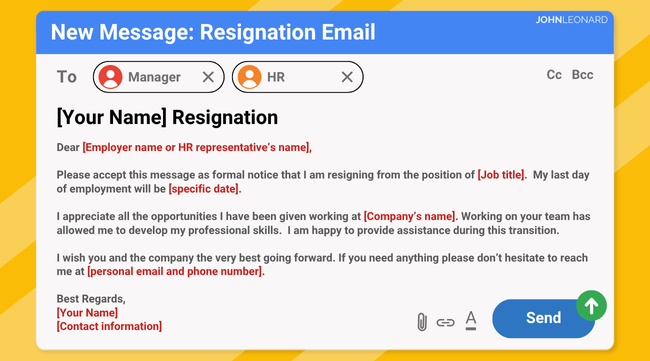
When leaving your current job, you want to be sure you end things on a positive note. To avoid any awkwardness when quitting, follow these tips to help you confidently write a professional resignation email.
Jump to:
Why Write a Resignation Email
A resignation letter is necessary to establish a clear record of your departure and to give you the chance to express gratitude to your employer. Even if you’re not leaving on good terms, it’s still recommended that you mention something you enjoyed or appreciated about the job. You want to remain polite to avoid burning bridges at all costs; you never know when you may need them in the future.
What to Include in Your Email
1. Keep Your Email Brief
When crafting your email, keep it brief. You’re not obligated to disclose what your next job is or your reasons for resigning. It’s okay to leave out details!
2. Clearly State Your Resignation & Last Day
Start by stating your title and the date you will be leaving, which typically is the day you provided in your two-week notice. Including your last day will give the employer time to find a new employee to fill your role.
3. Express Gratitude for the Opportunity
To remain humble and polite, express your gratitude for the opportunity. You don’t need to write an entire essay, but rather a few sincere sentences.
4. Offer to Assist with the Transition
It’s a good idea to mention that you are willing to help train any new employee(s) or create necessary training materials to help the next person transition smoothly. Avoid making any promises to assist after your final day.
5. Leave Your Personal Contact Information
In closing, if you feel comfortable, leave your personal contact information in case they need to get in contact with you for any reason
Resignation Email Example
Subject: [Your Name] Resignation
Dear [Employer name or HR representative’s name],
Please accept this message as formal notice that I am resigning from the position of [Job title]. My last day of employment will be [specific date].
I appreciate all the opportunities I have been given working at [Company’s name]. Working on your team has allowed me to develop my professional skills. I am happy to provide assistance during this transition.
I wish you and the company the very best going forward. If you need anything, please don’t hesitate to reach me at [personal email and phone number].
Best Regards,
[Your Name]

Ask an Expert
What should I not include in a resignation email?
“You do not want to include anything that could jeopardize your relationship with your current company or your career. You definitely should not include unnecessary details or anything negative or critical. Do not use negative language or tone, and do not mention anything emotional or personal, either about yourself or your co-workers. You need not even include the reason for your resignation.”
– Chris Wallingford, Senior Consultant
How much notice do I need to give to resign?
“You should always try to give at least two weeks’ notice. This allows your team time to prepare for your departure and begin searching for a replacement, helping ensure a smooth transition.”
– Samantha Mulrenin, Senior Consultant
To whom should I send my resignation email?
“Always send your resignation email to your immediate supervisor. They’re the person who needs to know first and who typically handles the next steps. If your company has a Human Resources department, it’s common to copy your HR contact so they can begin the offboarding process and handle benefits, final pay, etc.”
– Jennifer Kuchy, Senior Consultant
Is it more appropriate to resign in person or by email?
“Both really. You definitely want to resign in person or by video if you work remotely. Then follow that up with a formal email.”
– Elyse Gonsalves, Staffing Manager
Want more information that will help you to succeed in your career? Subscribe to The JOHNLEONARD Blog and receive the latest career advice!
